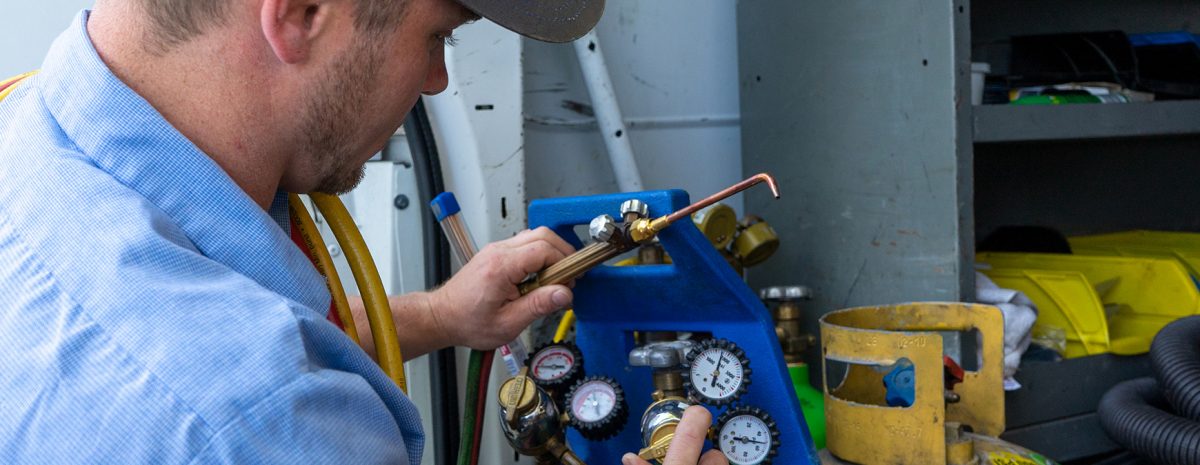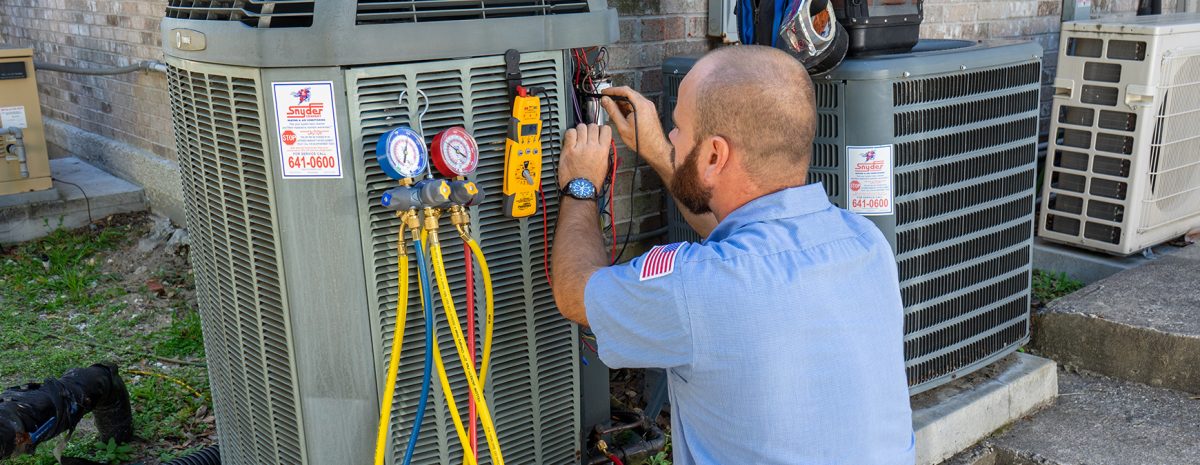RSI is a Great Training Option for Everyone
Learn more about how we can prepare you to advance your career.
Let’s start with answering the question, “What Is HVAC?” “HVAC” is an acronym for heating, ventilation and air conditioning. These days, it’s common to see an “R” added to the end for refrigeration: HVAC/R.1
So, what is an HVAC/R system? It’s the network of equipment in a home, commercial building or industrial setting responsible for conditioning the air.
- Heating units warm the
- Air conditioners cool
- Ventilation systems clean
- Refrigerators keep the air in smaller, confined spaces cold enough to preserve perishable foods.2, 3
Learn more about how an HVAC/R system works and the various types of equipment in this article.
How Does an HVAC/R System Work?
It depends on the system, but most heating and cooling equipment operate under the principles of fluid mechanics, thermodynamics and heat transfer.4
Fluid Mechanics
This is the branch of physics dealing with the mechanics of fluids in their various states: plasmas, liquids and gases. It also focuses on the forces moving fluids.5
Get Started on the Path to a New Career
Fill out our form to learn how we can help you change your life.
Thermodynamics
Thermodynamics is another branch of physics. It is the study of heat (thermal energy) and its relationships to other forms of energy, specifically how heat is converted to and from other forms of energy. The impact of heat on other matter is another area of focus of thermodynamics.6
First Law of Thermodynamics
Defined as the ability to do work, “energy can neither be created nor destroyed.” Instead, the different forms of energy—mechanical, electrical, chemical and heat—can only be converted from one form to another. Heat is defined as “the transfer of energy due to a temperature difference.”7
Second Law of Thermodynamics
According to the second law of thermodynamics, “to cause heat energy to travel, a temperature difference must be established and maintained.” Under this law, heat will always travel from a higher temperature area to a lower one.7
Heat Transfer
The process of moving heat from a high temperature area to a low temperature area is referred to as heat transfer.7
The Science of Refrigeration and HVAC
The science of refrigeration and HVAC encompasses more than the concepts discussed above. In fact, the principles and practices of HVAC/R is an entire field of study, often undertaken by individuals pursuing a career as an HVAC/R technician.
But these concepts can give you a better understanding of HVAC/R systems’ operational principles. They don’t create heat—they transfer it from one area to another to achieve the desired results for building occupants.7
If you want to learn more about how refrigeration works, you might want to consider enrolling in an HVAC program at a refrigeration school.
What Are the Different Types of HVAC/R Systems?

Let’s explore some of the popular options on the market for heating, cooling, ventilation and refrigeration systems.
Heating
The most popular option in North America is the furnace, so if you decide to work in the HVAC/R field, you could perform furnace maintenance somewhat regularly during the winter.
A furnace heats a home by blowing warm air into ducts. The ducts then deliver the air to the various rooms via grills and air registers.8
Boilers
Boilers, which are special-purpose water heaters, transfer heat through water. As the heated water passes through radiators in the rooms of the home, it releases heat into them.8 Some HVAC/R technicians specialize in boiler maintenance. These professionals are called boiler operators.
Heat Pumps
These systems transfer heat to warm or cool rooms and can be considered two-way air conditioners. In the summer, a heat pump channels heat from indoors to outdoors. In the winter, it reverses this process, bringing heat indoors from outside.8
High efficiency heat pumps are a popular option these days because they can save homeowners money on their utility bills.
Ventilation
Older and newly built energy-efficient homes rely on mechanical ventilation systems to maintain indoor air quality.9
Exhaust
These systems work by depressurizing the home. They exhaust air from inside the home while unintentional structural leaks and intentional vents allow fresh air into the building.9
With this system, a fan pressurizes the home, drawing outside air into the structure. At the same time, indoor air exits through leaks, fan ducts and vents.9
Balanced
Balanced ventilation systems exhaust polluted indoor air and bring in fresh outside air in equal quantities.9
Energy Recovery
Energy recovery systems reduce the expense of conditioning ventilated air by transferring heat either from the exhaust air or conditioned indoor air.9
Air Conditioning
Three out of four homes in the U.S. are equipped with an air conditioner, according to the Department of Energy. Below are the three most popular types of A/C units.10
Room Air Conditioners
Often called “swamp coolers,” room air conditioners rely on evaporative cooling, one of the four types of refrigeration. These units usually sit in a window and provide conditioned air only to the room in which they’re placed.11
Central Air Conditioners
How does a central air conditioning unit work? These systems circulate cool air throughout the home via a system of supply and return ducts, which emit the conditioned air into the various rooms via ducts and registers.12
Ductless Mini-Split Air Conditioners
For homes that lack the ductwork necessary for a central air conditioner, a ductless mini-split system may be a good option. Similar to central A/C units, these systems have an outdoor compressor and condenser and an indoor air-handling unit.
Ductless mini-split systems can be a good option for not only homes without ductwork but also for those where homeowners want to implement HVAC zoning.13
Refrigeration
Residential Refrigerators
These are the refrigerators found in homes that hold the quantity of food an average family would need to store and consume.
Commercial Refrigerators
Commercial refrigerators are bigger and typically used in the food industry for storing larger amounts of supplies.14
There is a whole area of the HVAC field focused on this equipment, with commercial refrigeration technicians specially trained to service it.
Train to Service HVAC/R Systems
Fascinated about the science of refrigeration and want to learn more? Driven to take apart mechanical equipment and troubleshoot problems with it?
Then a career servicing HVAC/R systems may be for you. Learn more about this field and the training that can be helpful for entering it by contacting The Refrigeration School at 888-671- 5803.
Additional Sources
1 https://www.acronymfinder.com/Heating-Ventilation-Air-Conditioning-and-Refrigeration-(HVACR).html
2 https://www.hvac.com/faq/what-is-hvac/
3 http://www.altenergy.org/Glossary/refrigerator.html
4https://www.researchgate.net/post/HVAC_system_design_is_based_on_the_principles_of_thermodynamics_fluid_mechanics_and_heat_transfer_What_is_the_backbone_to_the_HVAC_design
5 https://www.sciencedirect.com/topics/engineering/fluid-mechanics
6 https://www.livescience.com/50776-thermodynamics.html
7 Title: Fundamentals of HVAC; Authors: Carter Stanfield and David Skaves; Air-Conditioning, Heating, and Refrigeration Institute; Second Edition; Textbook page 109
8 https://smarterhouse.org/heating-systems/types-heating-systems
9 https://www.energy.gov/energysaver/weatherize/ventilation/whole-house-ventilation
10 https://www.energy.gov/energysaver/home-cooling-systems/air-conditioning
11 https://www.energy.gov/energysaver/room-air-conditioners
12 https://www.energy.gov/energysaver/central-air-conditioning
13 https://www.energy.gov/energysaver/ductless-mini-split-air-conditioners
14 http://www.comparefactory.com/residential-or-commercial-refrigerator-what-are-the-differences/
This blog has been labeled as archived as it may no longer contain the most up-to-date data. For a list of all current blog posts, please visit our blog homepage at https://www.rsi.edu/blog/




